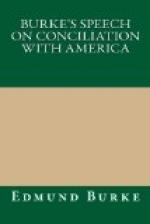Finally, it must be observed that no other writer of English prose has a better command of words. His ideas, as multifarious as they are, always find fitting expression. He does not grope for a term; it stands ready for his thought, and one feels that he had opportunity for choice. It is the exuberance of his fancy, already mentioned, coupled with this richness of vocabulary, that helped to make Burke a tiresome speaker. His mind was too comprehensive to allow any phase of his subject to pass without illumination. He followed where his subject led him, without any great attention to the patience of his audience. But he receives full credit when his speeches are read. It is then that his mastery of the subject and the splendid qualities of his style are apparent, and appreciated at their worth.
In conclusion, it is worth while observing that in the study of a great character, joined with an attempt to estimate it by conventional standards, something must always be left unsaid. Much may be learned of Burke by knowing his record as a partisan, more by a minute inspection of his style as a writer, but beyond all this is the moral tone or attitude of the man himself. To a student of Burke this is the greatest thing about him. It colored every line he wrote, and to it, more than anything else, is due the immense force of the man as a speaker and writer. It was this, more than Burke’s great abilities, that justifies Dr. Johnson’s famous eulogy: “He is not only the first man in the House of Commons, he is the first man everywhere.”
A GROUP OF WRITERS COMING IMMEDIATELY AFTER BURKE
Wordsworth . . . . 1770-1850
Coleridge . . . . . 1772-1834
Byron . . . . . . . 1788-1824
Shelley . . . . . . 1792-1822
Keats . . . . . . . 1795-1821
Scott . . . . . . . 1771-1832
TOPICS FOR SPECIAL REPORTS
1. “Like Goldsmith, though in a different sphere, Burke belongs both to the old order and the new.” Discuss that statement.
2. Burke and the Literary Club. (Boswell’s Life of Johnson.)
3. Lives of Burke and Goldsmith. Contrast.
4. An interpretation of ten apothegms selected from the Speech on Conciliation.
5. A study of figures in the Speech on Conciliation.
6. A definition of the terms: “colloquialism” and “idiom” Instances of their use in the Speech on Conciliation.
BIBLIOGRAPHY
1. Burke’s Life. John Morley. English Men of Letters Series.
2. Burke. John Morley. An Historical Study.
3. Burke. John Morley. Encyclopaedia Britannica.
4. History of the English People. Green. Vol. IV., pp 193-271.
5 History of Civilization in England. Buckle. Vol I, pp. 326-338




